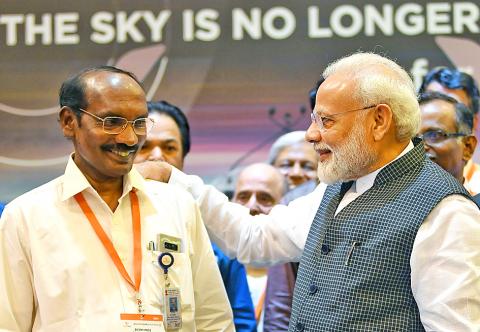India’s space program yesterday suffered a huge setback after it lost contact with an uncrewed spacecraft moments before it was due to make a historic soft landing on the moon.
Indian Prime Minister Narendra Modi sought to comfort glum scientists and a stunned nation from the lunar program’s command center in Bengaluru, saying that India was “proud” and clasping the visibly emotional mission chief in a lengthy bear hug.
The emerging Asian giant had hoped to become just the fourth country after the US, Russia and regional rival China to make a successful moon landing, and the first on the lunar South Pole after the mission’s launch in July.

Photo: AFP / Indian Press Information Bureau
However, early yesterday, as Modi looked on and millions watched with bated breath nationwide, Vikram, the lander named after the father of India’s space program, went silent just 2.1km above the lunar surface.
“The Vikram lander descent was [going] as planned and normal performance was observed,” Indian Space Research Organisation Chairman Kailasavadivoo Sivan said.
“Subsequently, the communication from the lander to the ground station was lost,” he said in a stunned operations room. “The data is being analyzed.”
However, the Chandrayaan-2 (“Moon Vehicle 2”) orbiter, which is to circle and study the moon remotely for a year, is “healthy, intact, functioning normally and safely in the lunar orbit,” the agency said.
Freshly re-elected Modi had hoped to bask in the glory of a successful mission, but he deftly turned into consoler-in-chief in a speech at mission control broadcast live on TV and to his 50 million Twitter followers.
“Sisters and brothers of India, resilience and tenacity are central to India’s ethos. In our glorious history of thousands of years, we have faced moments that may have slowed us, but they have never crushed our spirit,” Modi said.
“We have bounced back again... This is the reason our civilization stands tall,” he said. “When it comes to our space program, the best is yet to come.”
Chandrayaan-2 took off on July 22 carrying an orbiter, lander and rover almost entirely designed and made in India, a week after an initial launch was halted just before blastoff.
The agency had acknowledged before the soft landing that it was a complex maneuver, which Sivan called “15 minutes of terror.”
It was carrying rover Pragyan — “wisdom” in Sanskrit — which was due to emerge several hours after touchdown. The rover was expected to explore craters for clues on the origin and evolution of the moon, and also for evidence on how much water the polar region contains.
The Chandrayaan-2 space mission — India’s most ambitious so far — stood out because of its low cost of about US$140 million.
The US spent the equivalent of more than US$100 billion on its Apollo missions.
India is preparing Gaganyaan, its first crewed space mission, with the Indian Air Force on Friday announcing that the first level of selection of potential astronauts was complete.
The South Asian nation also hopes to land a probe on Mars.
In 2014, it became only the fourth nation to put a satellite into orbit around the Red Planet.

PREPAREDNESS: Given the difficulty of importing ammunition during wartime, the Ministry of National Defense said it would prioritize ‘coproduction’ partnerships A newly formed unit of the Marine Corps tasked with land-based security operations has recently replaced its aging, domestically produced rifles with more advanced, US-made M4A1 rifles, a source said yesterday. The unnamed source familiar with the matter said the First Security Battalion of the Marine Corps’ Air Defense and Base Guard Group has replaced its older T65K2 rifles, which have been in service since the late 1980s, with the newly received M4A1s. The source did not say exactly when the upgrade took place or how many M4A1s were issued to the battalion. The confirmation came after Chinese-language media reported

The Taiwanese passport ranked 33rd in a global listing of passports by convenience this month, rising three places from last month’s ranking, but matching its position in January last year. The Henley Passport Index, an international ranking of passports by the number of designations its holder can travel to without a visa, showed that the Taiwan passport enables holders to travel to 139 countries and territories without a visa. Singapore’s passport was ranked the most powerful with visa-free access to 192 destinations out of 227, according to the index published on Tuesday by UK-based migration investment consultancy firm Henley and Partners. Japan’s and

A Ministry of Foreign Affairs official yesterday said that a delegation that visited China for an APEC meeting did not receive any kind of treatment that downgraded Taiwan’s sovereignty. Department of International Organizations Director-General Jonathan Sun (孫儉元) said that he and a group of ministry officials visited Shenzhen, China, to attend the APEC Informal Senior Officials’ Meeting last month. The trip went “smoothly and safely” for all Taiwanese delegates, as the Chinese side arranged the trip in accordance with long-standing practices, Sun said at the ministry’s weekly briefing. The Taiwanese group did not encounter any political suppression, he said. Sun made the remarks when

BROAD AGREEMENT: The two are nearing a trade deal to reduce Taiwan’s tariff to 15% and a commitment for TSMC to build five more fabs, a ‘New York Times’ report said Taiwan and the US have reached a broad consensus on a trade deal, the Executive Yuan’s Office of Trade Negotiations said yesterday, after a report said that Washington is set to reduce Taiwan’s tariff rate to 15 percent. The New York Times on Monday reported that the two nations are nearing a trade deal to reduce Taiwan’s tariff rate to 15 percent and commit Taiwan Semiconductor Manufacturing Co (TSMC, 台積電) to building at least five more facilities in the US. “The agreement, which has been under negotiation for months, is being legally scrubbed and could be announced this month,” the paper said,